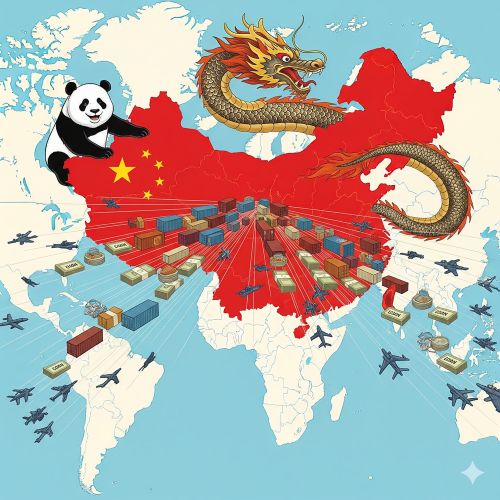How does China challenge U.S. dominance in the Indo-Pacific, and how does that competition spill over into American domestic politics?

China challenges U.S. dominance in the Indo-Pacific through a multi-faceted strategy that combines military modernization, economic influence, and diplomatic engagement.
This competition is a central theme in American foreign policy and has a significant spillover effect on domestic politics, shaping public discourse, policy debates, and even partisan divides.
China's Challenge to U.S. Dominance in the Indo-Pacific
China's approach to challenging U.S. dominance is a comprehensive one, targeting key areas of power: military, economic, and diplomatic.
-
Military Modernization and Power Projection: The Chinese military, the People's Liberation Army (PLA), has undergone a massive modernization effort. The People's Liberation Army Navy (PLAN) is now the largest in the world by number of vessels, with a focus on building a blue-water navy capable of operating far from its shores. China is also rapidly developing anti-access/area-denial (A2/AD) capabilities, including advanced anti-ship missiles and submarines, to deter U.S. naval forces from operating in the Western Pacific. The militarization of artificial islands in the South China Sea is a prime example of China's strategy to extend its military reach and assert its territorial claims. This directly challenges the U.S.'s long-standing naval presence and freedom of navigation operations in the region.
-
Economic Influence and the Belt and Road Initiative (BRI): China has become the top trading partner for many countries in the Indo-Pacific, leveraging its economic power to gain political influence. Through its Belt and Road Initiative, China has invested billions in infrastructure projects—such as ports, railways, and energy grids—across the region. These projects create an economic dependence on China, giving Beijing significant leverage. For example, a country reliant on Chinese investment may be less likely to align with U.S. positions on human rights or territorial disputes. This economic influence acts as a soft power tool, directly competing with U.S. diplomatic efforts to build alliances.
-
Diplomatic and Institutional Challenges: China is actively seeking to reshape regional and global institutions to better reflect its interests. It has established parallel institutions, such as the Asian Infrastructure Investment Bank (AIIB), which competes with Western-led organizations like the World Bank. China's diplomatic narrative, often articulated as "Asia for Asians," aims to delegitimize the U.S.'s role as an external power in the region and promote a regional order where China is the central player.
Spillover into American Domestic Politics
The strategic competition with China is no longer just a foreign policy issue; it's a major factor in American domestic politics, shaping debates on trade, technology, and national identity.
-
Economic Anxiety and Protectionism: The U.S. trade deficit with China has fueled a bipartisan consensus that China's trade practices are unfair. The loss of American manufacturing jobs has been a central theme in U.S. elections, with politicians from both parties blaming China for economic hardship. The "trade war" initiated by the Trump administration and continued with tariffs by the Biden administration is a direct manifestation of this domestic pressure. This has led to a more protectionist stance in American politics and a debate about how to "bring manufacturing jobs back" from China.
-
Technological Competition and National Security: The race for technological dominance, particularly in areas like 5G, artificial intelligence (AI), and quantum computing, has become a national security priority. Chinese companies like Huawei and TikTok have been at the center of this debate. The U.S. government has raised concerns that these firms could be used by the Chinese government for espionage or to influence public opinion. This has led to a ban on TikTok on federal devices and a heated political debate about the security of private data and the role of Chinese tech in American society.
-
Political Partisanship and Rhetoric: China has become a rare issue of bipartisan consensus in a deeply polarized American political landscape. Both Democrats and Republicans have adopted a more hawkish posture toward Beijing, viewing it as a strategic competitor. However, the rhetoric used to describe the China threat often differs. Some politicians use the issue to appeal to nationalist sentiments and frame the competition as a clash of civilizations, while others focus on the need for strategic competition and diplomacy. This has led to a domestic "blame game" where politicians vie to appear tougher on China, sometimes leading to oversimplifications of a complex relationship.
-
Human Rights and American Values: China's human rights record, particularly the crackdown in Xinjiang and Hong Kong, is a significant moral and political issue in the U.S. This has a strong domestic resonance, with politicians from both parties condemning the actions of the Chinese Communist Party (CCP). This focus on values reinforces the narrative that the competition is not just about power, but also about a clash between democratic and authoritarian systems.
In conclusion, China's challenge to U.S. dominance in the Indo-Pacific is a complex and multi-dimensional issue. It's not just a geopolitical rivalry but a competition that touches on every aspect of American life, from economic well-being and technological innovation to political rhetoric and national identity. The spillovers into domestic politics ensure that the China challenge will remain a central theme in American public and political life for the foreseeable future.
- Questions and Answers
- Opinion
- Motivational and Inspiring Story
- Technology
- Live and Let live
- Focus
- Geopolitics
- Military-Arms/Equipment
- Безопасность
- Economy
- Beasts of Nations
- Machine Tools-The “Mother Industry”
- Art
- Causes
- Crafts
- Dance
- Drinks
- Film/Movie
- Fitness
- Food
- Игры
- Gardening
- Health
- Главная
- Literature
- Music
- Networking
- Другое
- Party
- Religion
- Shopping
- Sports
- Theater
- Health and Wellness
- News
- Culture

